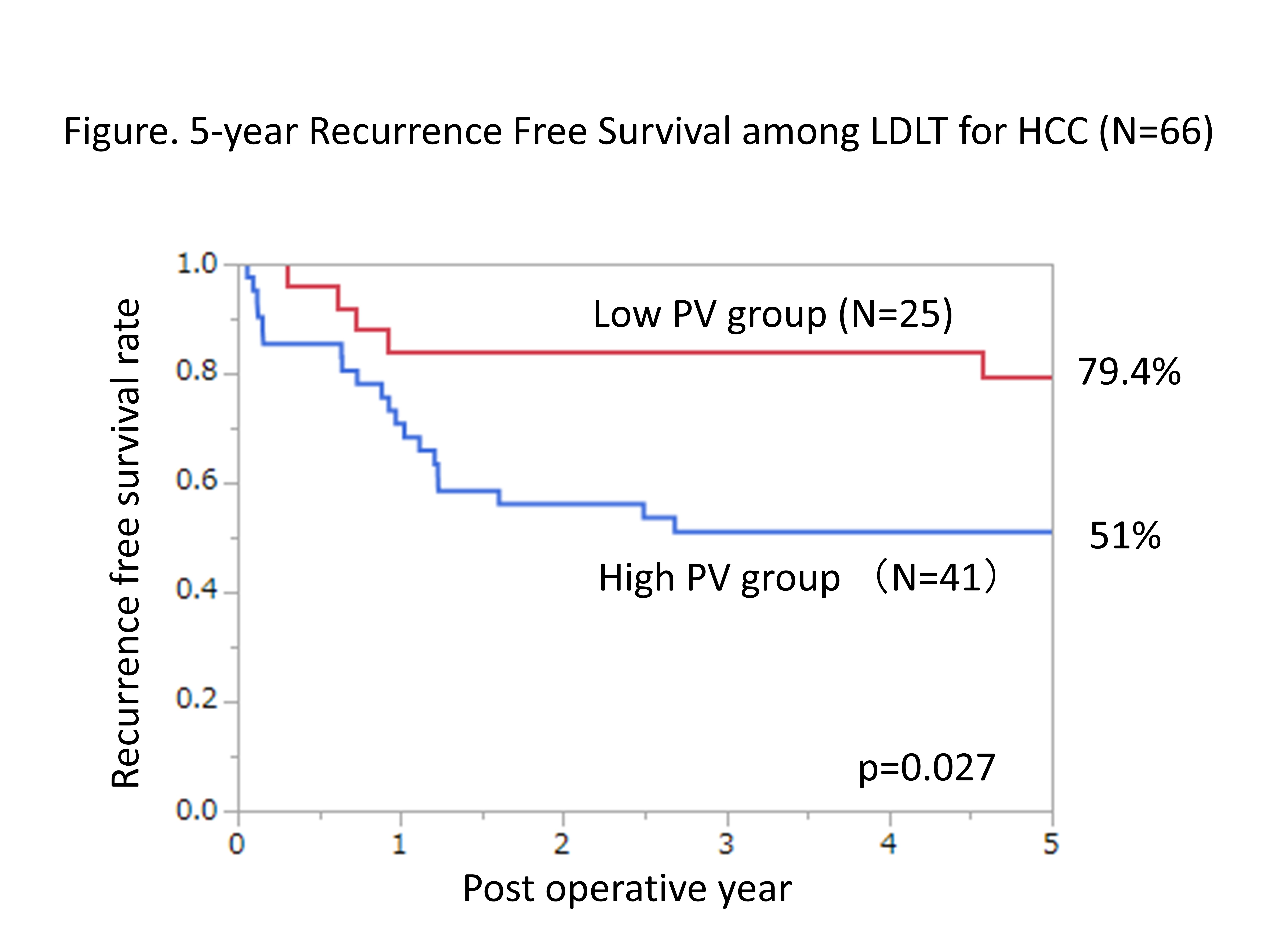Decreased Anti-Tumor Activity of Liver-Resident NK Cells via IL-33 Associated with Portal Hypertension after Living Donor Liver Transplantation
Hiroshima Uni., Hiroshima, Japan
Meeting: 2020 American Transplant Congress
Abstract number: D-368
Keywords: Liver, Natural killer cells, Tumor necrosis factor (TNF)
Session Information
Session Name: Poster Session D: Innate Immunity; Chemokines, Cytokines, Complement
Session Type: Poster Session
Date: Saturday, May 30, 2020
Session Time: 3:15pm-4:00pm
 Presentation Time: 3:30pm-4:00pm
Presentation Time: 3:30pm-4:00pm
Location: Virtual
*Purpose: It has been reported that increasing portal vein pressure after living donor liver transplantation (LDLT) was associated with a poor prognosis, risk factors for small graft syndrome, bloodstream infection, and acute rejection. Among patients with hepatocellular carcinoma (N = 66) in our department, the recurrence-free survival rate deteriorated in cases with elevated portal pressure. (79.4% vs 51%, p = 0.027) However, there has been no report on the analysis of the relationship between portal vein pressure and anti-tumor immune cells in the liver. We reported that liver-resident natural killer cells (lr-NK cell) activity reduced after partial hepatectomy and increased tumor volumes in mice model, depending on tumor necrosis factor-related apoptosis-inducing ligand (TRAIL). To clarify the weakening mechanism of lr-NK cells` activity, we has focused on IL-33, a cytokine released as DAMPs, due to sinusoidal endothelial cell injury and hepatocyte injury caused by portal hypertension and blood flow disturbance, using a portal hypertension mice model.
*Methods: The right branch of the portal vein was selectively ligated as a portal hypertension mice model, and the left hepatic lobe on the non-ligated side was evaluated. The lr-NK cell activity was evaluated by flowcytometory, cytotoxicity assay and expression analysis of IL-33 in liver tissue by quantitative PCR method.
*Results: (1) The TRAIL expression rate on lr-NK cells decreased in 28% in non-ligated lobe. (N=10, p<0.01) The cytotoxicity was significantly reduced in both lobes. (N=6, p<0.05) mRNA expression of IL-33 was significantly increased in both lobes. (N=5, p<0.05) (2) The TRAIL expression rate of lr-NK cells decreased in 44% after intraperitoneal administration of IL-33 (N=4, p<0.01) and decreased in 35% after co-cultured with IL-33. (N=4, p<0.01) The cytotoxicity of lr-NK cells also decreased significantly. (N=3, p<0.05) (3) After creating a portosystemic shunt to control the portal pressure, mRNA expression of IL-33 on the non-ligated lobe decreased (N=5, p<0.05), and the expression of TRAIL on lr-NK cells was maintained. (N=6, N.S.)
*Conclusions: IL-33 inhibited the antitumor activity of lr-NK cells. Decreased anti-tumor activity of lr-NK cells could be cancelled by a selective inhibition of the IL-33 pathway or controlling of portal vein pressure.
To cite this abstract in AMA style:
Imaoka Y, Ohira M, Sato K, Ohdan H. Decreased Anti-Tumor Activity of Liver-Resident NK Cells via IL-33 Associated with Portal Hypertension after Living Donor Liver Transplantation [abstract]. Am J Transplant. 2020; 20 (suppl 3). https://atcmeetingabstracts.com/abstract/decreased-anti-tumor-activity-of-liver-resident-nk-cells-via-il-33-associated-with-portal-hypertension-after-living-donor-liver-transplantation/. Accessed February 20, 2026.« Back to 2020 American Transplant Congress

